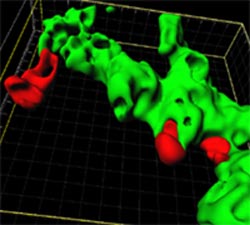Stem cells develop best in 3D

The research suggests that in the laboratory<br>beta cells can develop better<br>from stem cells in 3D. Photo: Joan Goulley<br>
Stem cells are responsible for tissue growth and tissue repair after injury. Therefore, the discovery that these vital cells grow better in a three-dimensional environment is important for the future treatment of disease with stem cell therapy.
“We can see that the quality of the cells produced two-dimensionally is not good enough. By putting the cells in a three-dimensional environment and giving them the proper growth conditions, we get much better results. Therefore we are developing a three-dimensional culture medium in gelatine in the laboratory to mimic the one inside an embryo,” says Professor Anne Grapin-Botton from DanStem at the University of Copenhagen, who produced the results together with colleagues from Switzerland and Belgium.
The international research team hopes that the new knowledge about three-dimensional cell growth environments can make a significant contribution to the development of cell therapies for treating diabetes. In the long term this knowledge can also be used to develop stem cell treatments for chronic diseases in internal organs such as the liver or lungs. Like the pancreas, these organs are developed from stem cells in 3D.
From stem cells to specialised cells
The research team has investigated how the three-dimensional organisation of tissue in the early embryonic stage influences development from stem cells to more specialised cells.
“We can see that the pancreas looks like a beautiful little tree with branches. Stem cells along the branches need this structure to be able to create insulin-producing cells in the embryo. Our research suggests that in the laboratory beta cells can develop better from stem cells in 3D than if we try to get them to develop flat in a Petri dish,” explains Professor Grapin-Botton.
“Attempts to develop functional beta cells in 2D have unfortunately most often resulted in poorly functioning cells. Our results from developing cells in 3D have yielded promising results and are therefore an important step on the way to developing cell therapies for treating diabetes.”
The research is supported by the Novo Nordisk Foundation, Swiss National Research Foundation, and the National Institute of Health (NIH), USA.
The results from the paper “Planar Cell Polarity Controls Pancreatic Beta Cell Differentiation and Glucose Homeostasis” have just been published in the scientific journal Cell Reports.
Contact:
Professor Anne Grapin-Botton
Mobile phone: +45 29634398
Media Contact
More Information:
http://www.ku.dkAll latest news from the category: Life Sciences and Chemistry
Articles and reports from the Life Sciences and chemistry area deal with applied and basic research into modern biology, chemistry and human medicine.
Valuable information can be found on a range of life sciences fields including bacteriology, biochemistry, bionics, bioinformatics, biophysics, biotechnology, genetics, geobotany, human biology, marine biology, microbiology, molecular biology, cellular biology, zoology, bioinorganic chemistry, microchemistry and environmental chemistry.
Newest articles

Superradiant atoms could push the boundaries of how precisely time can be measured
Superradiant atoms can help us measure time more precisely than ever. In a new study, researchers from the University of Copenhagen present a new method for measuring the time interval,…

Ion thermoelectric conversion devices for near room temperature
The electrode sheet of the thermoelectric device consists of ionic hydrogel, which is sandwiched between the electrodes to form, and the Prussian blue on the electrode undergoes a redox reaction…

Zap Energy achieves 37-million-degree temperatures in a compact device
New publication reports record electron temperatures for a small-scale, sheared-flow-stabilized Z-pinch fusion device. In the nine decades since humans first produced fusion reactions, only a few fusion technologies have demonstrated…





















